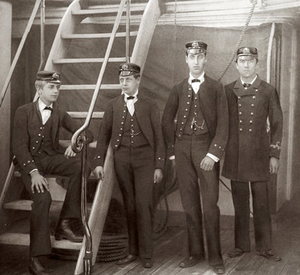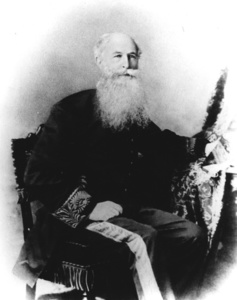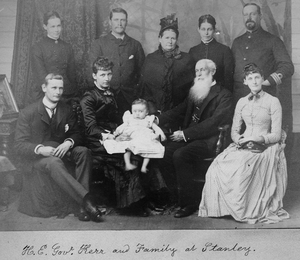KERR, THOMAS
1818 - 1907 from Barbados
governor, was born in 1818 in the West Indies, the son of David C Kerr, a commissary (military supply officer). He spent almost all his life in the Caribbean, entered the public service in 1855 and was a member of the House of Assembly in Barbados for three sessions from 1863-1866, representing the parish of St Joseph. In 1877 Kerr was a member of the Barbados legislative council and a judge of the assistant court of appeal (at £450 a year). He later referred to his 'loyalty to Governor Hennessy [of Barbados] when he [Hennessy] encouraged such furious hostility...and was deserted by most of those whose duty it was to assist him'. During 1878-9 Kerr administered the government in Grenada.
In August 1843 Kerr married Frances Ann Toppin: they had two daughters, Frances Evangeline Inniss and Isabellah Blanche Fleming. In April 1857 he was married a second time as a widower to Anna Maria, the daughter of Daniel Douglas a planter. They had two sons, Allan and Mark, and two daughters, Lilias and Mabel.
Kerr was appointed governor of the Falkland Islands in 1880 when he was already over the normal retiring age and he served for ten years - about twice the usual term. The family arrived in the Theben on 24 November 1880 - 'I can speak very favourably of the comfort which we enjoyed' he told London. His age was accentuated by a long white beard and Captain WISEMAN observed that Kerr was 'a charming man but such a fuddler and very loath to lose anyone to whom he can pour out his troubles, and they are many'. On the family, he remarked 'His Excellency is a very pleasant gentlemanly man, most unsophisticated, as indeed are all his family. He has lived nearly all his life in the West Indies, principally at Barbados. Mrs Kerr is a very pleasant motherly creature who has never been to England in her life, having been born in the West Indies and always lived there'.

Prince ALBERT VICTOR (1864-92) and...
In January 1881 Kerr was received by the two royal princes ALBERT VICTOR and GEORGE on board HMS Bacchante. They remembered him from their visit to Barbados the preceding year; but trouble in the Cape Colony meant that their stay was cut to 36 hours.
Kerr was unfortunate that his treasurer JW COLLINS was corrupt and when the latter's safe was eventually forced open a succession of administrative horrors emerged. Collins was arrested on 31 December 1881 and Kerr appointed his son Allan to hold the fort. Sorting out the confusion took its toll: Kerr reported 'my own health has suffered severely from such close application and night work'.
The colony was financially self-supporting during Kerr's term of office, but he faced problems over the survey and leasing of land. The FIC and the larger landowners were opposed to a proper survey (as it would reveal that their holdings were much larger than they were claimed to be) and wished to prolong their leases or change them into freehold. Kerr originally opposed them, writing to London in 1881: ' It is not desirable to dispose of the crown lands in such a way as to strengthen powerful local interests to the prejudice of small independent settlers'. Having resisted them until 1885, Kerr changed his view completely after his leave in England during 1886. His successor GOLDSWORTHY attributed this change to the fact that the Governor's daughter Mabel had married a West Falkland landowner.
Kerr took nine months sick leave from March to December 1886 (thus missing the second peat-slip in Stanley, which swept away several buildings and killed two people) and ACS BARKLY stood in as lieutenant-governor. Kerr later took six months leave in 1889-90, when EP BROOKS administered the government.
On his return in 1890 Kerr found that he had been attacked in Parliament by an Irish MP, Swift MacNeill, on the prompting of James SMITH of Stanley. MacNeill asked why Kerr was returning to Stanley aged 72 and implied that there were charges of embezzlement against him. A committee of LegCo (FE COBB and JJ FELTON) exonerated the governor, though in unenthusiastic terms. The final LegCo of Kerr's term authorised the sale of lands to the FIC, despite the protests of Dr HAMILTON that the two unofficial members (Cobb and Felton) had interests. Kerr laid the foundation stone of the new cathedral on 6 March 1890.
Kerr's daughter Mabel married Charles Anson on 7 April 1885: they had three sons born in the Falklands, two of whom died in Stanley during the influenza epidemic of 1890. Lilias Kerr married Commander Frederic Echlin RN in Stanley on 2 December 1885.
Kerr left Stanley on retirement on 28 March 1891. In a plea for a substantial pension (£500 a year) he pointed out that he only received £22 a year from Barbados and had no private income except a trifle derived from a small sum invested in Jamaica. He added:
To myself personally my 10 years residence in this rough, cold and stormy region, after a lifelong residence in the delightful climate of the West Indies where my health was perfect and my life enjoyable has been a term of physical suffering and discomfort, a Siberia in which my health has been impaired by repeated attacks of bronchitis brought on by the inevitable exposure without which I could not conscientiously have performed the duties which devolved on me.
He retired to Barbados where he died at his home, Yair Abingdon, in August 1907.
Kerr was not really up to the strains of government and it is difficult to see why he was appointed and why kept in office for so long. FE COBB told the FIC London office:
He is over seventy years of age and he is incapable of comprehending the fact that a government which disregards the wishes and susceptibilities of the people is an anachronism. He is personally unpopular and though I say nothing as to matters affecting his private character, I know enough of his ways to be able to say that I can not feel any great respect for him.
The Falkland Islands Magazine was a little kinder to him. On his departure in 1891, the April issue recorded that:
During the exceptionally long period of his Governorship the prosperity of the Islands has steadily progressed. Much has been done to improve the roads and sanitary state of Stanley .....education has been made compulsory and a Savings Bank established.......the trade of the Islands has expanded and in comparison with any other British Colony, when the number of the inhabitants is considered, takes the lead.
By giving way to the landed interests, Kerr effectively put a brake on the development of a small farmer class and condemned the colony to stagnation and the loss of its more ambitious sons through emigration.
External links
Comments
Revisions
July 2019 Two additional photographs added
September 2019 Correction to text made

